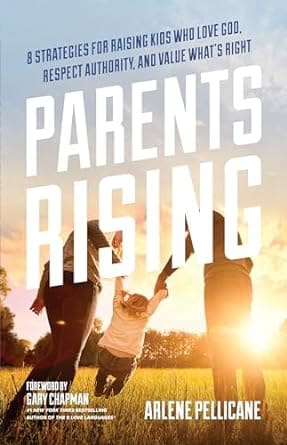
Arlene Pellicane and Parents Rising (Part 3)

John Farrell: Why are boundaries and routines important to a child’s development?
Arlene Pellicane: It gives that child security when they know what happens next. If things are constantly changing, then the child doesn’t feel as secure because just like adults, we like predictable things. If I go to church and I use the restroom, I’ll walk into the same stall every time. I don’t know why. I just do that. It’s what people do. We like predictability. We like things we know and it’s the same thing for children.
If they know after school, this is what I do, this is how my family usually eats dinner, and this is my normal bedtime. For instance, routines that are very key would be like a mealtime routine. How do we usually do this? Of course, some days – maybe Wednesday – you have to eat dinner late because so-and-so has practice. It doesn’t have to be the same every day, but there is a routine to it.
Then the bedtime routines – for there to be something at the end of each day where perhaps it is reading a chapter in the Bible or a few verses or a story for children, praying for them, saying goodnight, doing a high and low of the day, things like that. Those routines are like markers in the day so a child knows this is what’s happening next, this is what I can look forward to tomorrow and it gives that sense of security and stability.
For kids that are going back and forth in blended families that is more difficult because things change every few days, but there can be a routine in the home that they’re in. Let’s say if you’ve got your kid for two or three days, then make those days as similar as possible. Even talk with the other parent to find out what’s your bedtime at your place and have that kind of cooperation to make it as similar as possible. Not for the parent’s sake, but for the child’s sake so there is more routine to what kids are doing.
The Importance of a Strong Marriage While Raising Kids
JF: You mentioned briefly at the very beginning of our conversation about always keeping your marriage ahead of your relationship with your kids. I know for a lot of parents and couples that do have kids, this can be a little challenging at times. What advice do you have for those couples? How do they keep their marriage on track and a priority even above raising kids?
Arlene: You just think back to before you had baby number one, what was your family like? You realize, it was very directed at your spouse. You would have meals together, you would ask how you’re doing. That’s who you concentrated on, but once kids came into the picture, you say two words to each other and the rest of the day is about the kids’ needs.
Part of it is remembering your dating days, your courting days, and remembering that sweetness so that you don’t become just business partners and roommates. How do we do that? Well, it might be a 24-hour yearly getaway. Maybe it’s a quarterly getaway within half an hour of where you live. The point is that there’s times on your calendar that are just for the two of you to reconnect because you do get really busy as parents. It’s like fanning those early flames of when you were dating and treating each other with that kind of courtesy and looking forward to being together. In a very pragmatic sense, it’s setting aside time for you.
A lot of times people think, “I can’t leave my children. What will happen to them?” But most likely, whether it’s a family member or very close friends that you feel comfortable with that you could leave your kids with for 24 hours, it will do a world of good for your marriage if you know every year you have a getaway.
I have a friend who always called it a honeymoon. They would tell their children, “Daddy and I are going on a honeymoon.” So they have a honeymoon every year. It was really sweet because her kids always grew up with this idea of, “My mom and dad are always honeymooning,” which is super sweet. So set aside time for one another.
Another thing is the five- to thirty-second daily kiss because what happens? We stop kissing. If you think about it, that’s free. Doesn’t cost anything. It doesn’t cost much time. Five seconds is not that long. Even thirty seconds is not that long. You can do this. And it keeps that pilot light lit between you, and it’s the thing that no one else can do except you and your spouse. No one else can do that with your spouse except you. When your kids see people kiss, they’ll know, “My mom and dad do that.”
Then you can have your rituals when one of you comes home you just sit on the couch for five minutes together, just the two of you. Or you might have a date night once a month or once a week. Whatever works for you. Things like this that continually say, “Let me put the marriage first.”
When you’re at home, just very practically speaking, a lot of times your children call for you and you come running, but when your spouse says, “Hey dear,” you don’t come running in the same way. Mentally switch that so that if your spouse calls, you think, “Wait a minute. This is the most important person in my life, and they want something right now. Yes, dear. What can I get for you?” Have that same enthusiasm to serve that you show to your children, show that to your spouse.
JF: What advice do you have for parents who feel like they are failing in certain areas?
Arlene: Look at the promises of God’s Word. You can see “fear not for I am with you…” and you will see that God has created you fearfully and wonderfully made. The Bible calls on you to honor your father and mother. It doesn’t say that they’re prerequisites or how awesome you have to be before you’re honored. Fill your mind with God’s Word and God’s promises.
Don’t think, “I have to fix a thousand things,” because then you get overwhelmed and think, “I’m such a loser. I got this Parents Rising book and nothing changed, nothing happened.” Just pick one thing. If it’s, “I’ve been reading this book or article and I realized that we need to put the screens away during mealtime.” Then that’s the only thing you concentrate on and just get that done.
A week later when you realize, “Wow, we did it! We’ve gone a whole week,” then you can add the next thing that you want to work on. Don’t overcomplicate it. Stick to a few things that are easy to remember and things that are important to you.
You can ask yourself, “What’s the one thing I could change right now that would make the most difference in my family?” Maybe your child is having nightmares. Then the one thing that would help you the most is limiting any kind of violent things that they’re watching and giving them a more peaceful bedtime ritual every night. Just pick one thing and concentrate on that. Once that’s flowing well, move to the next thing.
Technology? Good or Bad?
JF: How do you avoid raising a teenager who’s addicted to video games or technology?
Arlene: If you’re looking ahead and you see a teenager that’s on their phone all the time and you think, “I don’t want that for my kid” and you have younger kids, then you certainly have a lot of power of what the normal is going to be for that child’s life. For instance, an elementary school child in fifth or sixth grade, even if their friends have a phone or social media or play video games, you don’t have to. You can say, “We just don’t do that.”
I have an eighth grade girl and a sophomore high school boy. Neither of them have phones, neither of them play video games, neither of them have social media. Those are all choices that we’ve made together and that they have understood since the time they were very young and it’s okay. They do just fine.
We have a lot of technology, so they use technology in the home. We’re not afraid of that, but they do not have personal devices. We looked and thought, “We don’t want that. We don’t want a child who is in college and beyond struggling with playing video game.” That was a very easy decision. So from the time they were little we decided we’re not a video game playing household. You can play it somewhere else. We go to Costco and while I’m shopping they like to play on the phones and that’s fine. I’m fine with that, but it’s not going to be at our house.
JF: How does God fit into all the strategies you’ve discussed in the book?
Arlene: God is the foundation of all these things. He is the one that empowers the parent to practice these strategies when it’s hard. It’s nice in a vacuum to think that you’re the parent and you’re going to tell the child what to do, but in that moment when your kid is screaming in the store, “Buy this for me now!” You start to think, “Oh my word. Let me just get this for you and get out of here.” However, in that moment for you to pray, “God give me the strength, give me the wisdom, and help me stay calm. Help me not blow up at my child. Help me say, ‘No, we’re not going to buy that and we’re going to leave the store.’”
It’s constantly being empowered by the Holy Spirit to do what you know is the right thing. For instance, in Parents Call the Shots, the God factor is that you realize you are the authority placed by God over this child. And if my child doesn’t learn to obey me, they’re going to have a hard time in life obeying God because God’s going to say go do this or don’t do this, and your child’s going to say, “Why should I listen to you? I never listen to my parents. I never listen to anybody.” Once we make that connection that if I can help my child obey me, that’s going to help my child have a stronger relationship with his or her heavenly Father.
With Amusement Is Not the Highest Priority, that’s really you thinking forward of wanting your child to have a relationship with God. You don’t just text God a prayer like, “God, could you please answer?” and then two seconds later here’s your answer. It’s just not how it works.
How your child is entertained impacts their relationship with God because they may think church is not entertaining and not want to go anymore. Or reading the Bible is kind of hard. It’s not easy like watching a YouTube video, so maybe I’m not going to read the Bible anymore. We have to realize things like this do impact their relationship with God.
All of these strategies, whether it’s having a routine, praying together, putting the marriage first, being nutritious, spending time together, or being wise about the future planning are all rooted in God’s Word.
God put the husband and wife together and said they’re going to be one flesh. That glue relationship is with the spouse. Biblically that’s how it is. That’s why we’re saying to let your marriage take the front seat because that’s who you’re going to be stuck with for the rest of your life. Not your children. Spending time together, of course, is something that shows your child love. That shows your child you’re interested in them.
…
Order your copy of Parents Rising: 8 Strategies for Raising Kids Who Love God, Respect Authority, and Value What’s Right by Arlene Pellicane
Trending Now
Sign up today for your Inspiration Today Daily Newsletter
Supercharge your faith and ignite your spirit. Find hope in God’s word. Receive your Inspiration Today newsletter now!
John Farrell
John Farrell serves as the Digital Content Manager at Inspiration Ministries, where he oversees the planning, organization, and management of website content to support the ministry's global digital outreach. With a strong background in writing and editorial strategy, John ensures that the articles, devotionals, and discipleship resources on Inspiration.org are accurate, engaging, and aligned with the ministry's mission.
John has authored more than 1,000 articles, press releases, and features for Inspiration Ministries, NASCAR, Lionel, and Speed Digital. His versatility as a writer is also showcased in his 2012 book, The Official NASCAR Trivia Book: With 1,001 Facts and Questions to Test Your Racing Knowledge.
A graduate of Appalachian State University, John brings excellence and attention to detail to the digital experience at Inspiration Ministries. He lives in Concord, N.C., with his wife and two sons.
Related Articles
February 13, 2026
How to Find Joy in the Midst of Sorrow
Sorrow has a way of arriving uninvited—and staying longer than we expect. Loss reshapes our lives,…
January 30, 2026
What’s Happening to Your Family?
Families around the world are facing challenges that feel heavy, confusing, and unfamiliar. This…
January 14, 2026
How to Build a Stronger Marriage
When the same arguments keep resurfacing and distance quietly grows, it’s easy to feel stuck. If…
August 23, 2025
If God Is a Loving God, Why Is There So Much Pain in This Life?
Why is there so much pain in this life? This heartfelt article wrestles with that question through…
Next Steps To Strengthen Your Walk
Inspiration Today Newsletter
Supercharge your faith and ignite your spirit. Find hope in God’s word. Receive your Inspiration Today newsletter now!
Christian Articles
Find articles to strengthen your walk and grow your faith. We have a wide range of topics and authors for you.
Submit A Prayer Request
We are here for you. Simply click on the button below to reach us by form, email or phone. Together we will lift our hearts and voices with you in prayer.





